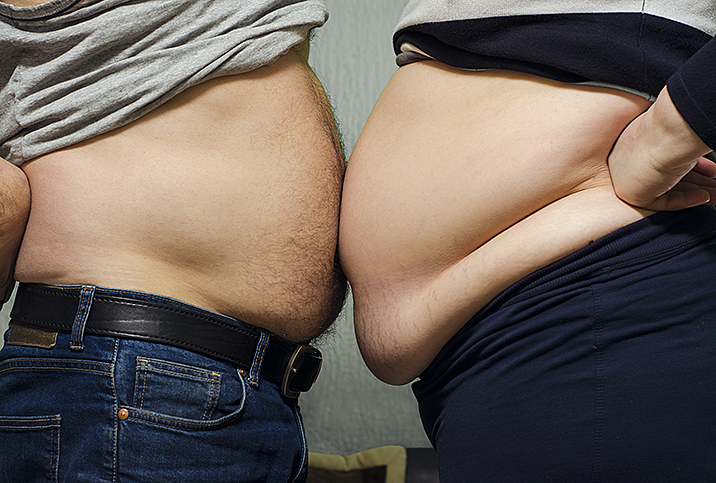5 Ways to Reduce Your Risk for Obesity (and Have a Better Sex Life)

The level of obesity is one of the most problematic health concerns in the United States. As of 2020, a whopping 42.4 percent of American adults suffer from obesity, which is signified by a body mass index (BMI) of 30 or more. BMI is calculated using a person's height and weight.
While this puts more Americans at risk for type 2 diabetes, heart disease and other cardiovascular disorders, obesity can also ruin your sex life.
If you're currently suffering from obesity, try these tips to lower your risk in the future and build a zesty, healthy sex life.
1. Exercise regularly
One main reason for weight gain and obesity is a sedentary lifestyle. This means you're almost completely inactive during the day, not engaging in any physical activity. In the modern age, this is often linked to activities that require staring at a screen, whether it's playing video games, watching television or simply working on your laptop.
The only way to combat a sedentary lifestyle is to slowly start an exercise habit. The Mayo Clinic suggests you need at least 150 to 300 minutes of moderate physical activity a week to prevent weight gain. To lose weight, you may have to engage in even more physical activity. Remember to take it slow. Starting a strenuous workout routine straight off the bat could sap motivation and cause more issues than it solves.
2. Change your drinking habits
Another cause of obesity in adults, specifically for people in their 20s, 30s and 40s, is alcohol. Because of the amount of sugar often found in alcohol, it's high in calories and provides almost no nutrition. For folks who drink as part of their social lifestyle throughout the week, on weekends or both, this can contribute significantly to adding pounds.
To curb this weight gain, drink in moderation or avoid drinking during certain time frames (during the week or taking a week or two off completely). If you find you're failing to meet this goal, try abstaining from alcohol altogether for a prolonged period. To jump-start this approach, you may want to join people during Dry January, which is an annual period of 31 days when you're encouraged to abstain from alcohol. Of course, waiting for January to come around may not work for you, in which case you can celebrate "Dry Whatever-Month-It-Is."
3. Change your diet
Eating habits change over time. If you have children or a hectic work schedule, fast food and pizza can often work their way into your regular diet. These high-calorie foods offer little nutrition and tons of fat, carbs and sodium—three items that can cause significant weight gain.
To counteract this effect, you'll need to turn to a healthier diet plan. The good news is these foods can still be as flavorful as the junk food you're used to eating. Fruits, vegetables, whole grains, chicken and fish are all healthy alternatives to fried foods, burgers and artificially flavored treats.
You don't have to give up junk food altogether, and some junk food can be replicated with healthier versions, such as pizza made with cauliflower crust instead of flour. Like drinking alcohol, you can enjoy junk food in moderation. Just don't fall back into the same habits.
4. Set goals
Another proven method to cut your risk for obesity or to lose weight is to set goals. The key is to set a goal achievable within a given time frame. Furthermore, the more specific you are about your goals, the better the results will be.
From the viewpoint of health risks, obese individuals should aim for weight loss of 5 to 10 percent of their current body weight. This typically helps lower blood pressure and improve blood sugar levels.
Fortunately, how you achieve these goals is entirely up to you. If you want to get stronger, lift weights. If you love basketball, go shoot some hoops and do some sprints. The idea here is not what you do, but how often you do it to achieve your set goals.
5. Download an app
In the past five years, weight-loss apps have made losing weight easier than ever. With diet programs, workout routines and alarms that remind you to exercise, these online tools can help keep you on track. There is a huge range of options such as FitBit, MyFitnessPal, FatSecret or HealthyWage.
Obesity isn't just a serious medical condition. Putting genetic factors aside, it's a lifestyle choice that can adversely affect your health and sex life. Overcoming obesity or lowering your risk for it often requires a total lifestyle change.
No one's saying it's easy to switch to healthier foods, exercise regularly and achieve all the goals you've set, but it's a story that has a wonderful ending: No longer will you run the risk of obesity, but instead you'll look forward to a longer, more energized future that gives you a new love for life as well as a great love life.


















